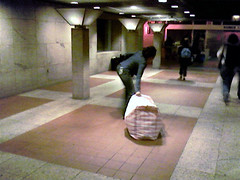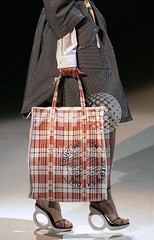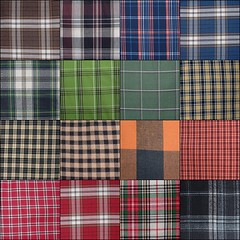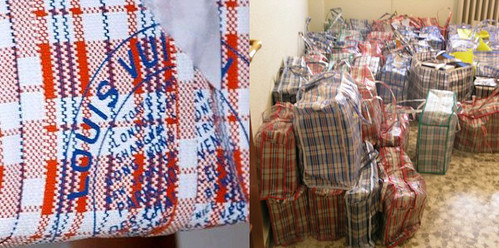Koranteng Ofosu-Amaah
April 13, 2007
Koranteng's Toli
Liz Hunt
June 2, 2007
Daily Telegraph
In Ghana and most of West Africa we call it the "Ghana must go" bag.
in Germany it is "Tuekenkoffer" or the Turkish suitcase; in America, the "Chinatown tote"; in Guyana as "Guyanese Samsonite" and elsewhere as the "Bangladeshi Bag"
During the Rawlings Chain lean years in the 1980s when it wasn't simply a matter of returning immigrants and the whole country was facing political and economic difficulties (Revolution! Ghana), they were simply called "refugee bags". We were all refugees then.
Alternatively in Ghana, and humourously, they are called "Efiewura Sua Me", literally "help me carry my bag". Indeed there's always someone at the bus or train station who needs help moving such bags. (And yes, I did help that young lady after taking a surreptitious snap with my dodgy cell phone. Chivalry isn't dead even at midnight at the bus terminal).
Right now, you can see these bags piled up in airport arrival halls around Britain, or stacked on luggage trolleys at train stations. London's streets, and those of other cities, are full of people weighed down by them.
Fashioning Bags
I wrote the foregoing to connect a few dots raised by a recent stir in Ghanaian newspapers. The headline read: Louis Vuitton sells "Ghana Must Go".
The images of models bounding down the catwalk at Marc Jacob's 2007 collection for Louis Vuitton raised the ire of a few commentators. An example:
The expensive shoes the model was wearing, indeed her entire outfit, stand in sharp contrast to the utility bag she was wielding. A typical review of the show mentions
a funny cheap checked shopping bag that carried a big, passport-style Louis Vuitton stamp...
the collection was a complex refraction of the many inspirational sparks that go into the work here: pieces synthesized to project the simultaneous multinational appeal this brand must maintain
The language of the style section is too clever by half but they captured the incongrousness and appeal of the image. A complex refraction indeed. A close look at a full slideshow of Marc Jacobs' creations shows that the bags of our tale were a leitmotif of the collection.
This is nothing new in fashion; slumming is a trope in the rarefied heights of haute couture. In recent years we have seen much appropriation of the sort and things like service uniforms (UPS, McDonalds etc.) have gained a fashion quotient. This is run of the mill piracy and the kind of tongue-in-cheek sentiment we applaud our designers for.
The author of the article was incensed that Ghanaians hadn't capitalized on the Ghana must go iconography and that others were now about to make hay out of a designer bag frenzy.
Having an idea stolen can be more difficult to deal with especially when the other party makes a bigger name and money off the idea than what it was originally worth...
A tempest in a tea pot in short.
Of course I could have pointed out that a proud Ghanaian artist was blazing these trails long before Marc Jacobs got there. Indeed there is an element of theft in this episode. If you look at Senam's work, you'll also see that she focuses on the passport stamp along with the Ghana must go bag. She highlighted not just the bag, the few personal mementos, photos and such, but also the passport stamp. Those who didn't have the requisite stamp on their residency papers or passports were the ones who were forced into upheaval with only these bags to carry their belongings into the unknown. Thus issues of legitimacy and exile are part of the questions she poses in her ongoing series.
In many ways, Jacobs's shtick was only a high-profile plagiarism. I expect Senam would be tickled by the nexus of commercialization and piracy that she likely provoked. The Akan proverb, humanity knows no boundaries, is one she would have been steeped in. Not to mention that the plaid pattern comes and goes used by all and sundry. The Wife notes incidentally that plaid is in this season in all the fashion magazines and stores. It was inevitable that others would latch on to it.
Pattern Matching
Let's first discuss the pattern. The majority of these bags are produced in China and it is fitting, given the interesting history of the pattern that covers them.
The plaid pattern is thought to originate in the Taklamakan area in Xinjiang Uyghur in China perhaps between 100-700BC and certainly by the 3rd century...
In any case, what claim does Ghana have to Ghana must go? Shouldn't the Nigerians, who ironically coined the term, have first cuts of any royalties? Heck these bags aren't even produced in Ghana, we are mere buyers and users. Our Chinese friends manufacture them using their native pattern. And, as we have seen, our local name for the bags is not widely known outside of West Africa. We're not the only refugees, immigrants or attendees of the school of hard knocks.
At 9am yesterday at Victoria's "Hell Corner" - where the cross-currents of commuters, tourists, travellers and newly arrived migrants clash as they fight their way between trains, Tubes, buses and the coach station - two scruffy little boys stood dwarfed by three of the bags.
Mesmerised by the bendy buses, one wandered towards the road, only to be shouted back by his older sister, who was carrying another of the bulging bags. Her mother was somehow managing three. Behind her was the grandmother, stooped and wrinkled beyond belief, but managing her own plaid tote. Eastern European, certainly, and undoubtedly poor.
My first thought was: "They're here to stay." And the second: "They're doing exactly what I'd do if I'd grown up in some poverty-stricken hell hole and there was a way out."
Bag Lady
The Ghanaian artist Senam Okudzeto has very personal knowledge of the history of "Ghana must go" and has incorporated its iconography into her work. If you look at the fragments of her recent exhibitions, you'll be exposed to a history of dislocation, of fractured, sudden enforced exile.
As my colleague Jeff Randall argued yesterday, unrestricted immigration has worrying implications for housing, healthcare and education and essential services. There are mutterings of an amnesty for illegal immigrants and that is, surely, the only practical way forward while also securing Britain's borders.
Plastic, rugged and functional, you can even wrap them with tape to ensure additional sturdiness so that they don't split when they are manhandled by underpaid bag handlers. You can place all sorts of foodstuffs in them: smoked fish, yams, meat and spices. And heck they are distinctive: plaid, woven and plastic. As such, they are fixtures in many routes serving the developing world.
But for those already here - well, the majority didn't make the journey so they could stay at the bottom of British society. The cheap, plastic bags they haul after them, overflowing with their belongings, are the modern equivalent of the battered leather suitcases piled high at the Ellis Island museum, a symbol of the self-interested determination of the immigrants who built America.
Anyone who has the ambition and aspiration to come here will not be satisfied with a tote bag for long.
Ghana must go versus Louis Vuitton
Bags and Stamps: a plagiarism in plaidSo to recap, a Ghanaian, by way of France and England, living in the USA, creates a collage starting with an image of Chinese-produced plastic utility bags taken by a Nigerian living in Spain - a 'theft' of the "Ghana must go" imagery, born of the interlocking episodes of reciprocal deportation and sundry exile between their two homelands, both former British colonies. The plaid pattern on said bags is originally Chinese although it is most celebrated in Scottish fabrics, and the subject of English schoolboy fantasies. Said pattern was transmitted in recent centuries over the corners of the British empire and is rightly part of Indian and especially Sikh heritage.
The symbolism of the bags is the signal subject of the work of a American-Ghanaian artist who grew up in Ghana, Nigeria and the UK (yes I should have mentioned Senam's Nigerian connection - isn't that a complication? And doesn't that explain the resonance of the Ghana must go iconography in her boundary-straddling life? Not to mention her focus on the passport stamp of approval. Sidenote: this modern traveller now has a very sensible Swiss connection, whither neutrality?)
This image is juxtaposed with a recent appropriation by an American fashion designer working for an France-based luxury company whose ironic contribution is to place a seal on the bag, contrasting the pennies on the dollar cost of the bag with a logo that is reknowned for its deleterious effects on even the fattest wallets - a logo, moreover, that is often counterfeited by Chinese manufacturers in a global shadow economy of knockoffs that are sold all over the world. The significance of the logo or stamp of approval is iconic in expressing authenticity, legitimacy and belonging, demarcating the boundaries separating countries at once, and luxury status symbols delineating the rich from the poor.
Incidentally this note was prompted by a posting by an Indian American, who is arguably more Ghanaian in sensibility than me from his few years in Ghana, said posting focused on the celebration of National Tartan Day by Scottish Americans and its implications for the desi community and diaspora.
The mind reels.
I have just booked a trip to England. My ostensible purpose is to get a stamp in my passport that will keep my notional residency in Her Majesty's lands legitimate. I am hedging my bets against this American episode; the stamp is my soul insurance if you will. Refugees all, we in Africa are no strangers to dislocation, in many ways it is our close friend. As the song goes, wherever I lay my hat, that's my home.
Modern travellers
Packing our bags
Seeking out stamps
The mementos of exiled souls




